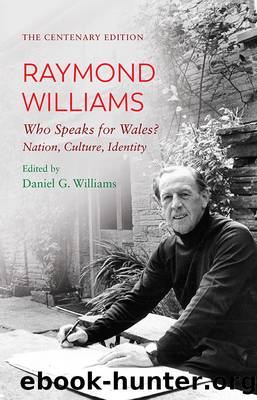The Centenary Edition Raymond Williams: Who Speaks for Wales? Nation, Culture, Identity by Raymond Williams

Author:Raymond Williams [Williams, Raymond]
Language: eng
Format: epub
ISBN: 9781786837066
Google: tPWbzQEACAAJ
Amazon: B0965NG1V9
Barnesnoble: B0965NG1V9
Goodreads: 58242826
Publisher: University of Wales Press
Published: 2021-05-15T00:30:40+00:00
Well, to begin with it went very quickly. What are now the second to the seventh chapters seemed just to flow. And I had got not only the village and the valley but the prepared lines through to Birmingham and Coventry, as well as to the Ministry in London, so it was all shaping in that form. Then I did a count. I had done six out of a projected thirty chapters, moving at the only pace at which I judged it could be properly done. It would be well over two hundred thousand words. And then it wasnât only the problem of publishing length; it was that on top of the reaction to Second Generation. I tried compressing, but that didnât seem to work. I left it for some time, and then so much else started happening: the decisive political break in â66 and the beginning of that very absorbing work on the Manifesto.18 Also a television producer who had read Second Generation came and asked me to do a play. I found the form interesting, though ironically the first play, Letter from the Country, eventually got acted in thirty rather than the original seventy-five minutes, but the second, Public Inquiry, was produced at the normal length. I welcomed the form because an action could be isolated, but I still felt, and feel, that the connecting composition of the kind of novel I had planned had more of what I wanted to say. So whenever I had a clear month I would go back to the chapters and try again; and it kept expanding. I had now a couple of additional chapters in Brussels, where one of the main characters goes to track down the source of the corporate initiative to create a new urban settlement in a Welsh valley. All these were ordinary writing difficulties â well ordinary nowadays, though the constraints of length are historically extraordinary â but by the late sixties I became increasingly aware that there was another set of problems, which amounted to a shift in perspective, though there seemed no discontinuity at the time. I saw the whole country and city relation, which from the beginning had been the general theme, as for me the crucial relation in contemporary social analysis. Iâd also started, remember, The Country and the City, but that had been foreseen as a smaller and more specifically literary book. Now it seemed to run through everything. I expanded its scheme and started a whole new programme of reading. For some time it was my only large-scale project, but then in turn I dropped it, feeling blocked. I did some smaller things, and then suddenly wrote the whole of The Country and the City, in its new form, very quickly. And that was all right, but still I would go back and look at those novel chapters. I didnât want to abandon them, but now much of the wider project of the novel had gone into the other book. I kept thinking it through and then I thought I saw an alternative shape.
Download
This site does not store any files on its server. We only index and link to content provided by other sites. Please contact the content providers to delete copyright contents if any and email us, we'll remove relevant links or contents immediately.
| General | Channel Islands |
| England | Northern Ireland |
| Scotland | Wales |
Room 212 by Kate Stewart(5105)
The Crown by Robert Lacey(4807)
Endurance: Shackleton's Incredible Voyage by Alfred Lansing(4769)
The Iron Duke by The Iron Duke(4349)
The Rape of Nanking by Iris Chang(4203)
Joan of Arc by Mary Gordon(4101)
Killing England by Bill O'Reilly(3995)
Say Nothing by Patrick Radden Keefe(3975)
I'll Give You the Sun by Jandy Nelson(3428)
Shadow of Night by Deborah Harkness(3360)
Hitler's Monsters by Eric Kurlander(3328)
Mary, Queen of Scots, and the Murder of Lord Darnley by Alison Weir(3202)
Blood and Sand by Alex Von Tunzelmann(3195)
Eleanor & Park by Rainbow Rowell(3153)
Darkest Hour by Anthony McCarten(3119)
Margaret Thatcher: The Autobiography by Thatcher Margaret(3079)
Book of Life by Deborah Harkness(2931)
Red Famine: Stalin's War on Ukraine by Anne Applebaum(2928)
The One Memory of Flora Banks by Emily Barr(2857)
